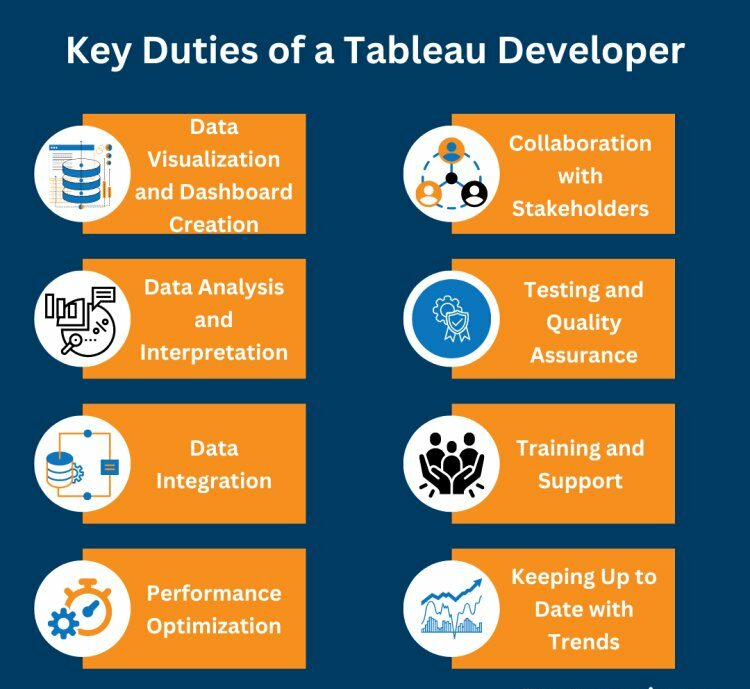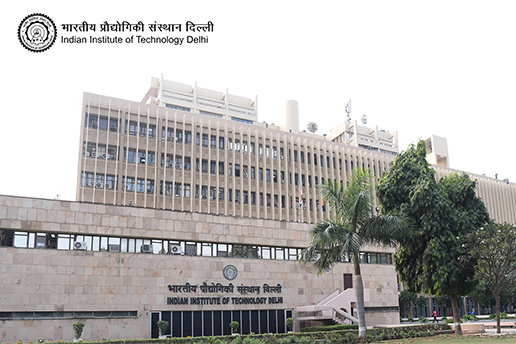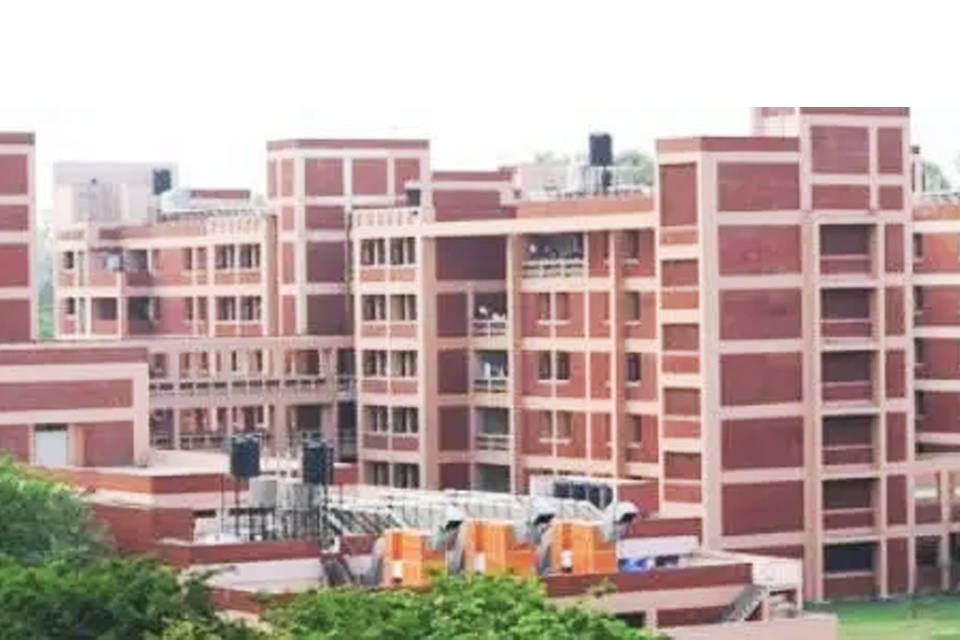Tableau Developer: Key Roles and Responsibilities
Table of Contents

Have you ever seen colorful dashboards that transform complicated data into accessible and insightful information? If yes, then it was likely built with Tableau.
Tableau is one of the world’s most powerful and user-friendly data visualisation tools, and it has completely changed how the world and businesses understand information. From multinational corporations to growing startups, organisations around the world depend on Tableau to tell stories from raw data.
The good news here is that because of this increasing reliance on it, Tableau Developer has quickly emerged as one of the most demanding career paths today. While companies are looking for people who can work with data, they are also looking for individuals who can make the data come alive in ways that help them make better decisions and achieve better outcomes.
So if you have ever wondered about the role of a Tableau Developer, what they do, their salary, and important skills, then this is the right place for you. You can think of this guide as your one-stop shop for everything you need to know about this exciting career path.
So, ready to learn? Let’s start from the basics!
What Does a Tableau Developer Do?

*datamites.com
These professionals work with Tableau to take mere numbers and convert data into dashboards and reports. They are much more than designers of different views; they also help organisations find patterns, trends, and opportunities in the data that they have collected.
In other words, they have the unique capability of simplifying complex data for the leaders tasked with making decisions so those leaders can ensure the organizational strategies are driven by substantial insights. In short, a Tableau Developer is a bridge between complex data and the business leaders who rely on it.
Tableau Developer Roles & Responsibilities

*mokkup.ai
When you hear the term Tableau Developer, what comes to mind? If you’re picturing someone sitting behind multiple screens, turning endless spreadsheets into stunning, easy-to-read dashboards, well you’re right on track!
Tableau Developers play a crucial role in today’s data-driven world, and their work goes far beyond just “making charts look easy.” They’re the experts who help companies get the full potential of their data, transforming it into powerful insights that guide smart business decisions.
So, what are the real tableau developer jobs on a day-to-day basis? Let’s break it down in simple terms.
1. Creating and Managing Dashboards
First and foremost tableau developer roles and responsibilities are to create a dashboard. Consider yourself a business leader who wants to have a quick look at sales trends, consumer behaviour, or financial performance. Instead of reviewing multiple complicated reports, a Tableau Developer builds interactive dashboards to quickly display exactly what you need, clearly and visually.
2. Data Integration and Management
Data doesn’t just show up magically in Tableau, it needs to be sourced from many different places first. And this is where the data integration and data management piece comes into play. Tableau Developers connect the Tableau tool to different databases, validate the data is accurate, and clear out any discrepancies so the data is ready for analysis. They are more or less data “chefs” who prepare the raw ingredients before they get plated for presentation.
3. Performance Optimisation
If a nice and clean dashboard takes forever to load and crashes every time you start analyzing a large dataset, then how attractive it is means nothing. Therefore, performance optimisation is another prominent tableau developer roles and responsibilities. Developers will upgrade dashboards to run fast, responsive and smooth, even when working with large datasets. This provides a seamless user experience with no frustrations.
4. User Training and Support
And here’s another thing that people generally overlook: Tableau Developers are not just techies that work in the background here. They are also trainers and advisers. In addition to building dashboards, they also run training sessions for employees and stakeholders to assist them with how to use them. They provide recurrent support to them from then on, answering questions, and making sure everyone is comfortable using and understanding the insights provided by Tableau.
5. Collaborating with Stakeholders
A Tableau Developer does not merely guess what they need in dashboards, they engage discussions with managers, teams and decision-makers to better understand their goals. Then the developer can take these business objectives and recommend solutions utilizing data. This same process of dialogue helps to keep the dashboards designed with the organization needs as the primary goal.
6. Data Security and Governance
Tableau Developers are also responsible for data governance and data security. They implement access controls, protect sensitive information, and adhere to regulations related to privacy. In summary, Tableau Developers are equally responsible for data availability and security, ensuring that data is actionable while also safe.
Important Tableau Developer Skills
So, what does it take to be successful as a Tableau Developer? It involves much more than just tool savvy; you’ll need a combination of technical and soft skills.
- When we’re talking technical skills, testing, coding, and QA (quality assurance) are important because they will help you keep your dashboards working smoothly, get reliable data, and allow you to generate factual results. Nobody wants a sharp looking dashboard that provides them with incorrect insights!
- When you know how to communicate, you can tell a complex data story to non-technical teams, so communication skills come in handy, as does being polite, open-minded, and thoughtful is nice for given circumstances.
- Being a multi-tasker and being able to manage projects can keep you on track with deadlines while balancing many dashboards or data sources simultaneously.
- Finally, being a team player (collaborating with a team mate) can make the excursion less overwhelming if you have willing yourself, and you are going to be striving to collaborate often with stakeholders, and these individuals, so the quality of relationship will make your project therefore the journey more fruitful.
Tableau Developer Salary in India
The average tableau developer salary in India, according to AmbitionBox, is between ₹ 3.5 lakhs and ₹ 11 lakhs per annum, with a national average for the country being around ₹ 7.1 lakhs
Entry-level tableau developer salary varies between ₹ 3 lakhs and ₹ 5 lakhs
As developers progress to a mid-level role, they make higher compensation, and Senior Tableau Experts and Consultants can earn as much more than the national average.
Wrapping Up
In this blog, we have explored the major roles and responsibilities of a Tableau Developer and the means by which they facilitate the transformation of complicated data into meaningful information. As companies across industries lean more on data-driven decisions, not surprisingly, Tableau Developers are obviously of utmost importance; and with the amount of data processed in total by organisations and the world at large, the need for qualified experts who can manage, analyse, and represent that data is certain to be in great demand.
For anyone wanting a career in analytics, you will never go wrong by registering for online courses in Business Intelligence and Analytics through Jaro Education. It will help you hone your knowledge and skills about Tableau and provide access to an exciting and rewarding career. Visit our website to explore our online courses today.
Frequently Asked Questions
How can I become proficient in Tableau?
You can start taking courses online, gain certifications, and practice using real-world projects to gain hands-on experience.
What certifications would be useful?
The Tableau Desktop Specialist, Computer Associate, or Certified Professional are good for career advancement.
What does a day in the life of a Tableau professional look like?
A Tableau professional spends the day designing and updating dashboards, managing data sources, analyzing information, and helping teams with reports and reporting needs.
What does a Tableau professional do for projects?
They tend to do things like sales dashboards, analyze customers for insights, give financial statements, and create efficiency trackers to help companies make educated decisions with their data.


















